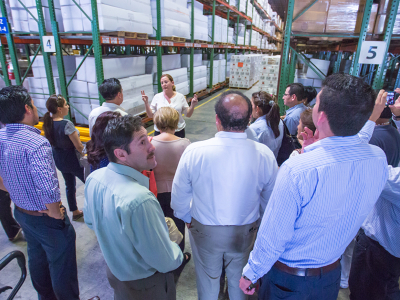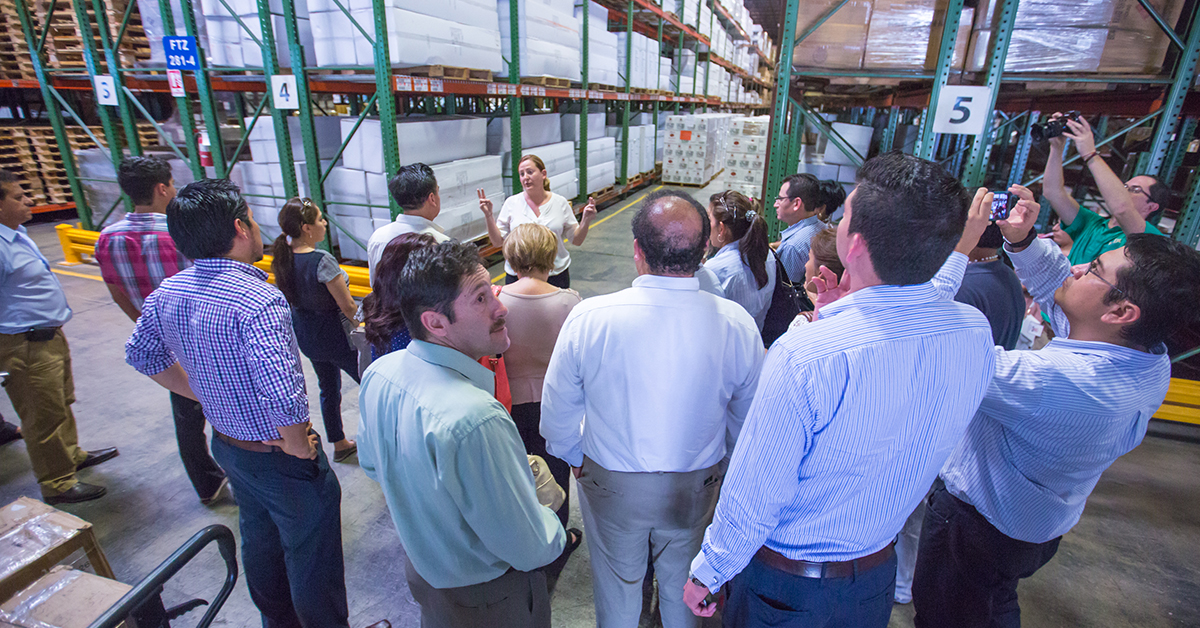Logistics and supply chain management plays a considerable role in the global economy. Some consider it the make-it or break-it point of any business. Recent global disruptions, from the COVID-19 pandemic to geopolitical events, have underscored how critical robust supply chains are. In response, companies and governments have been investing heavily in strengthening supply chain resilience, and the field is experiencing rapid growth. The U.S. Bureau of Labor Statistics projects 19% job growth for logisticians from 2023 to 2033, far above the average (U.S. Bureau of Labor Statistics).
Depending on the size of a company, there are a variety of significant positions that work together for the successful implementation of a supply chain. In recent years, new specialized roles focusing on technology, risk management, and sustainability have also emerged to meet evolving industry needs.
The benefit of pursuing a Master of Science in Logistics and Supply Chain Management (MSLSCM), is getting familiar with the responsibilities of these roles, learning to master the analytical skills needed, getting hands-on experience with a wide range of logistics technology, including emerging tools in artificial intelligence and automation, and developing essential market knowledge.
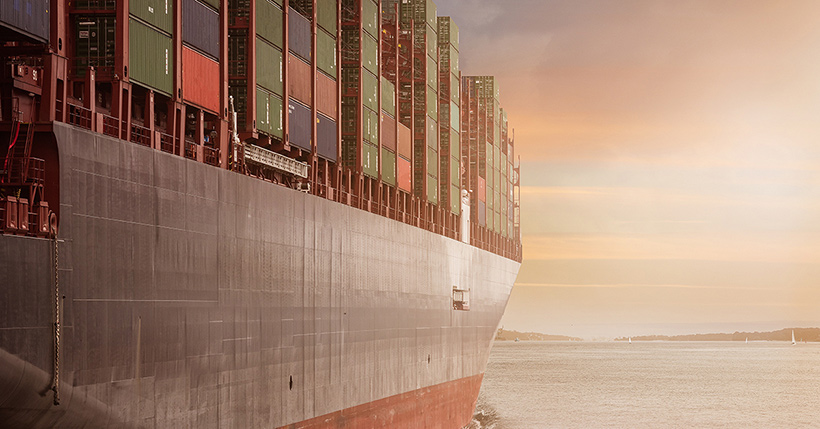
Here are just some of the roles an MSLSCM can prepare you for:
Logistics Analyst or Manager
Logistics analysts work to create a more productive, cost-efficient, and profitable business in terms of streamlining product warehousing, transportation, and distribution. Logistic analysts are vital employees in all industries and play a key role in major corporations to small businesses. Extensive knowledge of logistics and production planning concepts is needed. They also need experience in databases, statistical applications, data mining, analysis, and reporting.
Logistics Managers play more of a supervisory role managing employees, working with analysts to implement all the changes and optimizations, creating reports and maintaining vendor relationships. Nowadays, logistics analysts are also often leveraging AI-driven software for tasks like route optimization and demand forecasting, which significantly boosts accuracy and efficiency. Having the know-how in these AI-driven softwares along with the traditional analytical toolkit of the logistics analyst and manager is crucial to leading and working effectively in this position.
Supply Chain Analyst or Manager
Supply chain analysts examine the entire process from raw materials to the final product that reaches the customer. Their goal is to optimize the system to be efficient and cost-effective. Supply chain managers can oversee everything from manufacturing, packaging, inventory, and delivery.
Vital to a company's success, supply chain experts have knowledge in data analysis, reporting, inventory planning, warehouse management, the ability to handle a budget, and often solve complex problems. In the supply chain manager role, you will also be involved in cross-functional collaboration within an organization to streamline processes. In recent years, supply chain managers have placed greater emphasis on risk management and resilience planning. In fact, CEO surveys now rank supply chain crises among the top business risks, so supply chain analysts are increasingly tasked with developing contingency plans and building more flexible, “shock-proof” supply chain models to protect their companies.
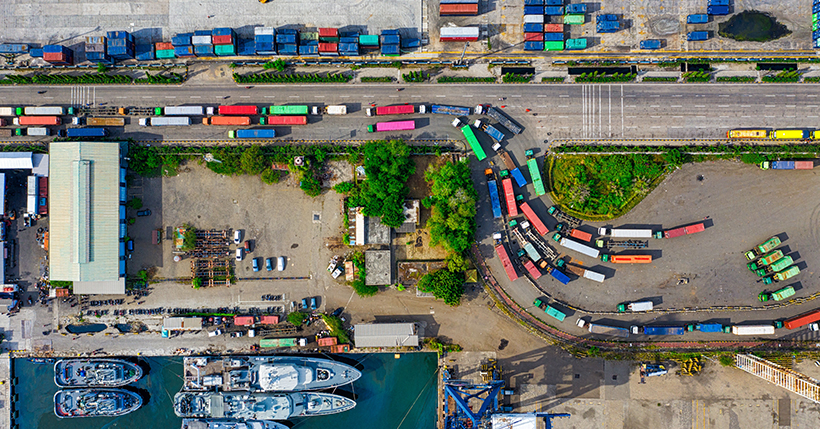
Fleet Manager
Fleet managers are logistics specialists in the transportation industry. They play the vital role of overseeing a company's transportation operations, whether they're transporting people or products. Their vast responsibilities include managing vehicles and their drivers, arranging schedules and deliveries, ensuring routine maintenance, negotiating with suppliers and analyzing the entire transportation operation effectiveness and cost-efficiency. They work closely with other departments to support the company's missions and goals, finding ways to cut costs and maximize profits while complying with all transportation laws and regulations.
New technologies are transforming the work flows for today’s fleet manager. Many fleet operations are adopting electric vehicles and AI-enabled route optimization to reduce fuel costs and emissions. Advanced telematics systems now provide real-time data on vehicle performance and delivery routes, helping fleet managers improve safety and efficiency. These innovations require fleet managers to be technologically savvy while continuing to meet all regulatory and service requirements.
Warehouse Operations Manager
Any company that must store and distribute products knows how important a high-functioning warehouse is. A warehouse operations manager oversees all activities in that facility, including supervising employees, developing product movement and storage systems to help improve operations, and accounting for every product coming in and out of the warehouse. They develop and enforce all policies and procedures for warehouse activities and keep detailed records of inventory.
In today’s climate driven by technology and automation, warehouse operations are rapidly automating to address labor shortages and improve speed. Today’s warehouse operations managers may oversee a mix of human and robotic workers. For example, autonomous mobile robots now assist with picking and packing in many modern warehouses. Despite this progress, about 80% of warehouses today have no automation at all, which means there is still enormous room for efficiency gains. In one industry survey 47% of executives said they plan to increase investments in warehouse automation to meet demand (iGPS Logistics). Warehouse operations managers are now at the forefront of implementing these technologies and processes, all while ensuring inventory accuracy and safety.
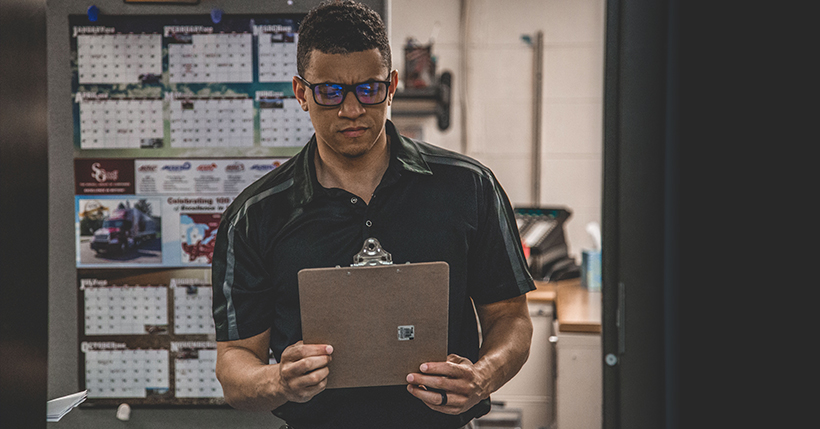
Storage and Distribution Manager
Storage and distribution managers work in warehouses or distribution centers. In this role, they focus on the storage and distribution operations within an organization. This role supervises the receiving, storing, and shipping of products or materials in a safe, timely and cost-efficient manner. They use sales information to forecast warehouse volume changes or transportation requirements. Managing all shipping-related documentation also falls under this role.
In the age of e-commerce, storage and distribution managers increasingly rely on data analytics and real-time tracking systems to anticipate fluctuations in demand and to ensure on-time deliveries. Customer expectations for fast, reliable shipping are higher than ever, so these managers are implementing more agile distribution strategies. By analyzing sales trends and using modern logistics software, they can dynamically adjust warehouse throughput and transportation plans to maintain efficiency even during peak periods or unexpected surges.

Global Logistics Manager
A global logistics manager has similar responsibilities as a regular logistics manager just on an international scale. Their operations go beyond borders into different countries and continents, moving and managing operations and products all around the world.
Often the lead of several regional logistic and supply chain teams, global managers require extensive knowledge in trade compliance, customs, all transportation modes (rail, air, sea), controlling costs of delivering and storing products in foreign places and negotiating contracts. Recent geopolitical and economic shifts have made this role even more critical. Many companies are diversifying their supplier base and manufacturing locations to reduce risk. For instance, the share of U.S. goods trade with China fell from about 21% in 2018 to just 14% in 2023, reflecting a trend toward “nearshoring” production closer to home (Deloitte). A global logistics manager must navigate such changes by developing logistics strategies that account for new trade policies, tariffs, and regional partnerships, all while maintaining cost-effectiveness and timely delivery across borders (McKinsey & Company).
Procurement Manager
Procurement managers research, evaluate, and buy products, materials or services for companies. This could be to either resell to customers or to use in their own everyday operations. They're great negotiators as they work to create deals to buy large quantities of products. They work with suppliers and develop purchasing strategies that meet the company's budgetary and other operational requirements, working closely with the finance team.
In today’s environment, procurement managers also incorporate sustainability and risk considerations into their strategies. Nearly 86% of manufacturers surveyed in late 2023 reported they had taken steps to “de-risk” their supplier base over the prior two years for example, by qualifying alternate suppliers or sourcing locally, in response to disruptions (Deloitte). At the same time, companies are ramping up responsible sourcing and ethical procurement practices; 44% of organizations increased their supply chain sustainability initiatives in the last year alone (DuJack). Procurement managers are at the center of these efforts, ensuring that suppliers meet environmental, social, and governance (ESG) standards and that supply contracts include provisions for flexibility and resilience.
Facilities Manager
Facilities managers are responsible for the security, maintenance, and services of facilities to ensure that they meet the needs of the organization and their employees. Services can include security, parking, cleaning, catering and technology. They also supervise the staff that works in cleaning, maintenance, grounds, and security. They allocate and manage space between buildings and ensure that facilities meet government regulations and environmental, health and security standards. Facilities managers are generally responsible for ensuring everything to do with the physical infrastructure of the business is running as it should, as well as identifying areas for greater efficiency and cost-savings.
In recent years, facilities managers have begun adopting smart-building technologies to improve efficiency and sustainability. From IoT sensors that monitor equipment performance to energy management systems that cut electricity usage, modern facilities management intersects with supply chain goals by reducing operating costs and supporting corporate sustainability targets. For instance, many warehouses and distribution centers are now installing solar panels and using automated climate control to lower their environmental footprint. By embracing these innovations, facilities managers help the supply chain run cleaner and more cost-effectively while still maintaining safety and reliability.
Vice President of Logistics and Supply Chain Management
Vice presidents (VPs) of Logistics and Supply Chain Management are responsible for overseeing all the aspects of the logistics and supply chain processes in their company. These VPs oversee procurement, logistics, operations, planning and scheduling, and inventory management. They supervise and support their departments to help achieve the goals that they have established. They also collaborate with the executive team to meet the overall company goals. They have a vast list of roles and responsibilities, but ultimately, they must analyze business data and make the key decisions. They report their progress to the other executives, the president, and the CEO.
In today’s work environment, Supply chain executives have had to spearhead major digital transformation initiatives. A VP of Supply Chain might lead the implementation of advanced planning systems, AI-driven analytics, blockchain traceability, and other emerging technologies across the supply chain (Egon Zehnder). They are also charged with building resilience into the company’s operations, for example, redesigning networks for flexibility or increasing strategic inventory, while balancing cost and efficiency. The VP of Logistics/Supply Chain now plays a key strategic role in the C-suite, translating supply chain capabilities into competitive advantage and ensuring that lessons from the 2020–2022 disruption period are applied to future strategy.
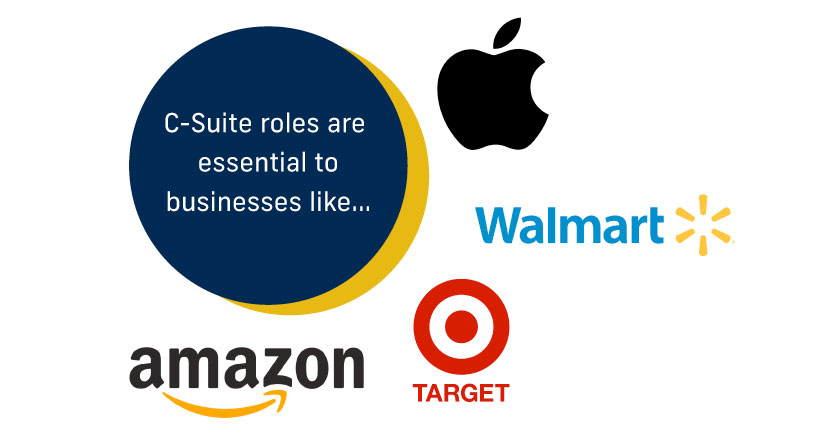
C-suite roles: Chief Operating Officer, Chief Supply Chain Officer, Chief Logistics Officer, Chief Executive Officer
There are companies that need logistics and supply chain experts on their c-level executive teams. These companies include Target, Amazon, Walmart, FedEx, The Walt Disney Company, Bacardi, Apple, Nike and many others. Over the years, we have seen how crucial great logistics supply chain management is for a company's success. In today's global economy, the supply chain is central to business models and represents the ultimate source of competitive advantage.
This has led several prominent companies to have professionals with supply chain experience lead their enterprises – like Apple’s Tim Cook and General Motors’ Mary Barra. And more organizations are creating new roles, like Chief Supply Chain Officer (CSCO) and Chief Logistics Officer (CLO). The upheavals of the past few years have further accelerated this trend. The demand for CSCOs is now higher than ever, as companies recognize the need for dedicated leadership to drive resilience, cost management, and innovation in the supply chain. It’s not uncommon in 2025 for the CSCO or CLO to be one of the most influential voices in the executive suite, guiding decisions on everything from supplier strategy to technology investments.
Supply Chain Sustainability Manager
As sustainability becomes a core concern, many firms are appointing Supply Chain Sustainability Managers to ensure that environmental and social responsibility is woven into their logistics operations. These professionals develop and implement strategies to reduce the carbon footprint and waste across the supply chain, working on initiatives like cutting Scope 3 emissions, the indirect emissions from supply chain activities (DuJack). They might oversee programs for sustainable sourcing of materials, reduction of packaging, and optimizing transportation routes for lower fuel consumption. Pressure on supply chain teams to improve sustainability has been rising every year, driven by consumer expectations and regulations, and as a result sustainability managers now play a key role in compliance (ensuring suppliers meet labor and environmental standards) and innovation (finding eco-friendly process improvements). This role is relatively new, but it’s growing fast. Thousands of job postings are now seeking supply chain sustainability analysts or managers, reflecting the priority companies are placing on sustainable supply chains today.
Supply Chain Resilience Manager
The volatility of recent years has created a strong need for resilient processes deeply embedded within organizations. This demand for resilience has given rise to the role of Supply Chain Resilience Manager, sometimes called Supply Chain Risk Manager. Virtually all companies are rethinking their supply chain design in light of recent disruptions, at the end of 2023, 97% of firms surveyed said they were reconfiguring supply chains in some way (Kilpatrick and Sloane). A resilience manager’s mission is to anticipate and prepare for such disruptions. They continuously identify risks, from natural disasters to political upheavals to supplier bankruptcies and develop contingency plans to ensure business continuity. This can involve qualifying alternate suppliers, optimizing inventory buffers, diversifying transportation modes, and creating “playbooks” for emergency response. Many organizations now have dedicated teams for supply chain risk monitoring, and companies like Apple have hired senior Supply Chain Resilience Program Managers to proactively mitigate risks and lead cross-functional responses to disruptions. The supply chain resilience manager works closely with analysts, logistics managers, and executives to build a more robust supply chain that can adapt quickly when unexpected challenges arise.
Supply Chain Data Analyst/Scientist
Modern supply chains generate vast amounts of data, from sales forecasts and inventory levels to telematics from shipping fleets and sensor readings in warehouses. This has led to a surge in demand for Supply Chain Data Analysts (or Data Scientists) who can turn this data into actionable insights. These specialists apply advanced analytics, machine learning, and predictive modeling to optimize every aspect of the supply chain. For instance, they might develop AI-driven demand forecasting models (which can cut forecast errors by almost half and greatly reduce stockouts), or they might use data science to find the most efficient delivery routes and inventory placement. A supply chain data analyst/scientist helps companies realize the full value of these tools, identifying patterns and trends from big data sets, building optimization algorithms, and supporting strategic decisions with quantitative evidence. As supply chains become more digital and data-driven, this role is emerging as one of the top career paths for those with both logistics knowledge and analytical expertise.
How to Get Started
In an era of rapid change, staying ahead in logistics and supply chain management requires you to continuously update your skills and knowledge. Whether you're looking to get started in the industry or accelerating your career, a graduate education is a perfect way to develop your technical knowledge while developing your business skills to take on leadership roles.
If you're interested in learning more about our Master of Science in Logistics and Supply Chain Management, click here to learn more.
Works Cited
Deloitte. “Global Supply Chain Resilience Amid Disruptions.” Deloitte Insights, 2024,https://www2.deloitte.com/us/en/insights/industry/manufacturing/global-supply-chain-resilience-amid-disruptions.html.
DuJack, Evelyn. “7 Supply Chain Trends Manufacturers Should Watch in 2025.” L2L, 2025,https://www.l2l.com/blog/supply-chain-trends.
Egon Zehnder. “Majority of Supply Chain Leaders Worried About Operating Costs, Survey Says.” Egon Zehnder, 27 Feb. 2025, https://www.egonzehnder.com/functions/supply-chain-operations/press-releases/majority-of-supply-chain-leaders-worried-about-operating-costs-survey-says.
iGPS Logistics. “Navigating the Future of Supply Chains: Predictions for 2024.” iGPS Logistics, 2024,https://igps.net/navigating-the-future-of-supply-chains-predictions-for-2024/.
Kilpatrick, Jim, and Matt Sloane. “Restructuring the Supply Base: Prioritizing a Resilient, Yet Efficient Supply Chain.” Deloitte Insights, 23 May 2024,https://www2.deloitte.com/us/en/insights/industry/manufacturing/global-supply-chain-resilience-amid-disruptions.html.
U.S. Bureau of Labor Statistics. “Logisticians.” Occupational Outlook Handbook, U.S. Department of Labor, Apr. 2025, https://www.bls.gov/ooh/business-and-financial/logisticians.htm.

